Sigma 10-20mm f/3.5 EX DC HSM
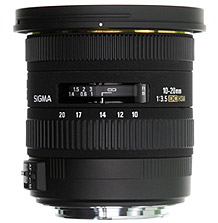 With a brighter f/3.5 aperture, the new Sigma 10-20mm lens will be better for low-light photographers. Priced at £440, does the new lens warrant the price tag? |
Sigma's ultra-wide offerings have long been a popular choice among photographers looking for a high quality alternative to manufacturer's own offerings in this range for a more reasonable price.
Designed for use with DSLRs fitted with sensors smaller than 35mm, such as Canon's EF-S compatible cameras, Nikon's DX format and Sony or Pentax digital SLRs, this update to Sigma's incredibly popular 10-20mm lens range offers an equivalent angle of view to a 15-30mm lens on a full frame camera. Olympus and Panasonic users can also purchase a version compatible with Four Thirds format SLRs where this lens will provide an equivalent angle of view of a 20-40mm lens. This updated version costs around £440 and offers a faster constant maximum aperture than its predecessor, which is still available for around £400. Both lenses use Sigma's Hyper Sonic Motor to achieve autofocus.
The ultra-wide zoom market is quite crowded at the moment, with other manufacturers all offering at least one lens in this range. Tamron's 10-24mm f/3.5-4.5 costs around £380 and adds a useful extra 4mm to the long end of the zoom range, although it doesn't have a silent focus motor like the Sigma and has a variable aperture which is slower at the long end.
To confuse matters even more Tokina offer three lenses in this range, non of which have a silent focus motor like the Sigma lenses, but they all sport a constant maximum aperture. At the top of the Tokina tree is the 11-16mm f/2.8, which costs around £490. Although the zoom range is shorter, the maximum aperture is two-thirds of a stop faster, making it more suitable for hand-held work in available light. Tokina also offer two 12-24mm f/4 lenses, one with an improved focus motor which costs around £485 and their original version costing around £430.
Canon users also have the choice of the Canon EF-S 10-22mm f/3.5-4.5 USM lens, which offers 2mm extra on the long end of the zoom, but has a variable maximum aperture.
Nikon currently offer two lenses that cover this range, their pro-spec Nikkor 12-24mm f/4 costs around £805 and is similar on paper to this Sigma, except the maximum aperture is one third of a stop slower and it doesn't offer as wide a field of view. A 10-24mm zoom is also available from Nikon costing around £640, which has a variable maximum aperture.
Sony's only current ultra-wide lens for their APS-C format cameras is the DT 11-18mm f/4.5-5.6 lens, which costs around £480 has a shorter zoom range, a slower variable aperture and no silent focusing motor.
Pentax offer a 12-24mm f/4 lens for use with their digital SLRs. This optic costs around £795, but doesn't have a silent focus motor and the aperture is one third of a stop slower throughout the range than on this Sigma lens.
And finally, Olympus offer three lenses in this range. Their 7-14mm f/4 is much wider, but costs £1500. Their 11-22mm lens has a brighter maximum aperture at 11mm, but costs around £735 and their 9-18mm lens has a slower, variable maximum aperture, but is much smaller, lighter and costs £470.
Sigma 10-20mm f/3.5 EX DC HSM: Handling and features
Typical of Sigma's EX line of lenses, this optic feels well put together and the fit and finish is excellent. Much of the lens barrel has a powder coating applied to it, which certainly looks the part when new. The section close to the the lens mount, which is different depending on the camera type it is meant to be fitted to, doesn't have the same powder coating on the sample provided for review. Although the finish on this section is acceptable, it looks a little odd next to the rest of the lens construction, as if Sigma decided not to coat this section for some reason or another.
This lens extends by approximately 5mm during zooming and is longest at the 10mm end of the range. The zoom mechanism is very smooth and well damped, allowing for precise composition. By comparison, the focus ring feels much stiffer, requiring quite a bit of effort to rotate, Autofocus is blindingly quick and accurate, thanks in part to the silent focusing motor and the focused distance is clearly visible through the window on the top of the lens barrel. No depth of filed scale is provided though, which although typical of modern autofocus lenses, is bit of a shame. Those wishing to manually set the lens to its hyper-focal distance will have to refer to a separate calculator in order to find the correct distance.
Odd-sized 82mm filters can be fitted via the filter thread on the front of the lens. Although 77mm filters would have been my preference, it is understandable that the filter thread needs to be so large due to the extreme angle of view and brighter maximum aperture. Those using square filters such as the Cokin system will need to invest in larger filters than the P-series, as the holder vignettes horribly on this lens.
Sigma 10-20mm f/3.5 EX DC HSM: Performance
For this review, the lens was tested on a 10Mp Nikon D80 using Imatest.
At 10mm, this lens gave mixed resolution results, but showed it is capable of producing images with very good sharpness across the image area. At f/3.5, the centre resolution is already very good and the edges of the frame acceptable. Stopping down appears to reduce the resolution in the centre very slightly although the sharpness towards the edges improves. f/11 gives the best resolution across the frame, which should provide plenty of depth-of-field for landscape purposes. Diffraction starts to soften images at f/16 and f/22, although the resolution recorded at f/16 is still at good levels.
In the middle of the zoom, at 14mm, the resolution characteristic of this optic changes somewhat, with the centre resolution reducing somewhat. However the centre resolution is still good between apertures of f/3.5 and f/16, with the best quality across the frame being achieved at f/11 again.
And finally, at 20mm, the lens appears to be at its best at this focal length with the centre resolution approaching excellent levels. The highest resolution across the frame is still achieved at f/11, which means this aperture can be set knowing that the highest resolution will be achieved no matter what the zoom setting is.
Click on the thumbnail for the larger image.
| Resolution at 10mm |
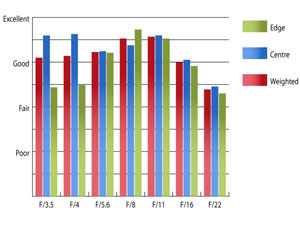 |
| Resolution at 14mm |
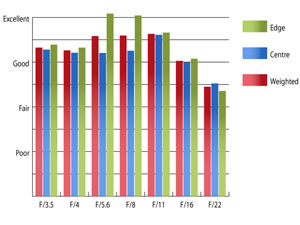 |
| Resolution at 20mm |
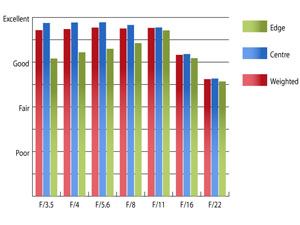 |
Chromatic Aberrations are kept in check well by this optic. At their worst they only just exceed 0.8 pixel-widths at 10mm and f/4, which shouldn't pose too many issues in normal picture taking scenarios.
Click on the thumbnail for the larger image.
| Chromatic aberration at 10mm |
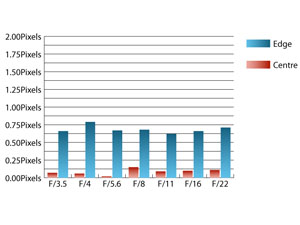 |
| Chromatic aberration at 14mm |
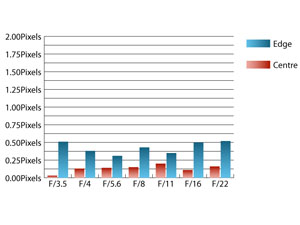 |
| Chromatic aberration at 20mm |
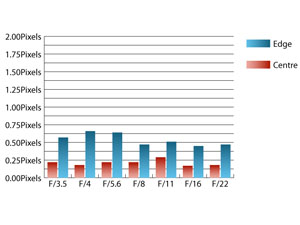 |
Light falloff towards the corners may be noticeable at 10mm and f/3.5. At these settings, the corners of the image a 2.24stops darker than the centre of the image. Stopping the lens down to f/8 provides even illumination at this focal length. At 20mm, vignetting is less of an issue although the corners of the image are still 1.6stops darker than the image centre. Stopping down to f/5.6 provides even illumination at this focal length.
Typical of ultrawide lenses, barrel distortion is quite strong at 10mm. Imatest recorded 4.64% barrel, which will cause problems with straight lines towards the edge of the frame. However, the shape of the distortion is uniform so this should be fairly straightforward to correct in image editing software afterwards. By 20mm, the barrel distortion has been replaced with a very low level of pincushion. Imatest recorded 0.213% pincushion distortion, which should pose very few issues in normal shooting situations.
Click on the thumbnail for the larger image.
 |
 |
Ghosting and flare are well enough controlled by this lens. At 10mm strong point sources of light may cause a bright blue ghost image to appear in the frame on the opposite side of the image in extreme circumstances. Light sources just outside the frame may cause a slight loss of contrast, although he supplied petal-shaped hood helps to minimise this phenomenon.
Sigma 10-20mm f/3.5 EX DC HSM: Verdict
 For its price, Sigma's latest 10-20mm is a very interesting lens indeed. The comparatively bright constant f/3.5 aperture make composing and confirming focus in low light conditions easier than with its slower predecessor, which will certainly help those shooting dimly-lit interiors and at night.
For its price, Sigma's latest 10-20mm is a very interesting lens indeed. The comparatively bright constant f/3.5 aperture make composing and confirming focus in low light conditions easier than with its slower predecessor, which will certainly help those shooting dimly-lit interiors and at night.The 82mm filter thread may put some off this lens, as the price for filters such as circular polarisers sky-rockets when you venture beyond 77mm. Even taking this into account, this optic still represents excellent value for money when compared to manufacturer's own offerings, which can be almost twice the price.
Sigma 10-20mm f/3.5 EX DC HSM: Pros
 Very good resolution
Very good resolution Good build quality
Good build quality Excellent value
Excellent value Low levels of Chromatic Aberrations
Low levels of Chromatic AberrationsSigma 10-20mm f/3.5 EX DC HSM: Cons
 82mm filter size
82mm filter size Stiff manual focus ring
Stiff manual focus ring| FEATURES |  |
| HANDLING |  |
| PERFORMANCE |  |
| VALUE FOR MONEY |  |
| OVERALL |  |
Sigma 10-20mm f/3.5 EX DC HSM: Lens specification
| Price: | £440 |
| Contact: | www.sigma-imaging-uk.co.uk |
| Filter size: | 82mm |
| Format: | Four Thirds, APS-C |
| Construction: | 13 elements in 10 groups |
| Angle-of-view: | 102.4 - 63.8° |
| 35mm equivalent focal length (on APS-C body): | 15-30mm |
| Internal focusing: | Yes |
| Image stabilisation: | No |
| Minimum focus: | 24cm |
| Maximum aperture: | f/3.5 |
| Minimum aperture: | f/22 |
| Weight: | 520g |
| Size (lxw): | 88.2mm x 87.3mm |
| In the box: | Lens hood, Padded Case |
The Sigma 10-20mm f/3.5 EX DC HSM costs £438.99 and is available from Warehouse Express here:
Sigma 10-20mm f/3.5 EX DC HSM - Canon fit
Sigma 10-20mm f/3.5 EX DC HSM - Nikon fit
Sigma 10-20mm f/3.5 EX DC HSM - Sigma fit
Add your message
Login required
Please login here or if you've not registered, you can register here. Registering is safe, quick and free.
Please login here or if you've not registered, you can register here. Registering is safe, quick and free.
photodo Stats
1102 lenses
428 MTF tests
74 in-depth photodo reviews
100+ users join each day
Help the lens community by reviewing or rating a lens today via our lens search
428 MTF tests
74 in-depth photodo reviews
100+ users join each day
Help the lens community by reviewing or rating a lens today via our lens search
Latest Lens Reviews
- Chinon 28mm f/2.8 Vintage Lens Review
- Canon EF 70-200mm f/4L IS II USM Lens Review
- Samyang AF 85mm f/1.4 EF Review
- Sigma 70mm f/2.8 DG Macro Art Review
- Samyang AF 24mm f/2.8 FE Review
- Meike 50mm f/1.7 Review
- Tamron 70-210mm f/4 Di VC USD Review
- Lensbaby Burnside 35mm f/2.8 Review
- Asahi Super Takumar 50mm f/1.4 Review
- Asahi Super-Multi-Coated Takumar 135mm f/3.5 Review
